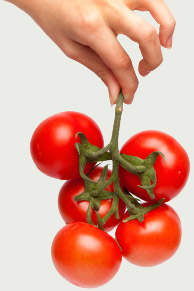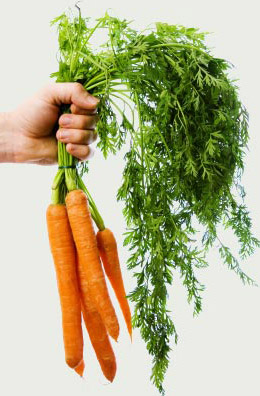
Organic, local or conventionally grown foods: Which should I buy?
Posted in General Health & Wellness on July 5, 2011. Last modified on April 29, 2019. Read disclaimer.
Nutritional experts have differing opinions on the questions of, "Are organic or local foods safer, healthier or just more expensive?"
Here we'll look at the arguments that can be made for each growing method. We'll also offer, what we think is a great solution.
First, there is one thing that all nutritionist agrees on: Everyone should be eating more produce -- a minimum of two servings of fruit and three servings of vegetables daily.
Regardless of how most fruits and vegetables are grown, they are a rich source of vitamins, minerals, phytonutrients and fiber that may help protect us against stroke and other cardiovascular diseases as well as certain cancers. Almost any fruit or vegetable is a better food choice than over processed, fat or sugar laden alternatives.
+ Free Shipping & Returns on Eligible Items.
(*Amazon's Top 100 list updated hourly.)
The argument for eating organically:
Though at least one well-respected, independent monitoring group has doubts, the US Dept. of Agriculture and the Food and Drug Administration assure us that the number and amounts of chemical fertilizer, pesticide and herbicide residues found on commercially grown foods are almost always within safe ranges. Everyone agrees, however, that the fewer and less amount of these toxic chemicals we consume, the better. (This is especially true for children whose brains are still developing and whose smaller body size may not be able to tolerate the chemical levels that would be acceptable for full sized adults.) Some of these are toxins are believed to effect the human nervous system, disrupt our endocrine system and increase the chances of developing cancers or chronic diseases. Organically grown foods are produced without synthetic chemicals or fertilizers, genetic engineering, radiation or sewage sludge so those toxins can not find their way into our foods, impact the environment or harm farm workers.
The benefits of eating locally grown foods -- especially those purchased directly from farmers, farm stands or farmers markets that offer locally grown produce (some farmers market vendors resell foods grown great distances away):
Fresher foods usually tastes better, last longer, and may contain more nutrition. If it takes a week to deliver produce from California and get it stocked into your local grocery, many of the beneficial nutrients may already be gone. While refrigeration certainly helps keep foodborne bacteria at manageable levels and maintaining food safety, according to the New York Times, refrigerated fruits and vegetables lose up to 50% of their Vitamin C and other nutrients in the first week. When you purchase foods directly from the local producer, there is good chance that the food you are purchasing today was harvested just hours earlier.
The case for conventionally grown foods:
Price, availability and selection matter. If you want oranges in December and you live in Pennsylvania, they're going to be brought in from far away. And large, specialized farms that use modern chemistry and technology are often able to produce foods at a lower cost than small farms. So, if you are trying to manage on a tight budget, conventionally grown foods may be your best option.
Thanks to Environmental Working Group (EWG), we may be able to pick the best of all three options. It IS possible to enjoy maximum taste and nutrition with the least amount of chemical residue while still saving money!
Each year, the EWG pours over data collected by the USDA and FDA and produces a list of the foods with the highest and lowest total pesticide loads. According to EWG's calculations, "consumers who choose five servings of fruits and vegetables a day from EWG's Clean 15 list rather than from the Dirty Dozen can lower the volume of pesticides they consume by 92 percent. They will also eat fewer types of pesticides. Picking five servings of fruits and vegetables from the 12 most-contaminated products would result in consuming an average of 14 different pesticides a day. Choosing five servings from the 15 least contaminated fruits and vegetables would result in consuming fewer than two pesticides per day."

Dirtiest Dozen
Highest in Pesticides
Buy these organic
Apples
Celery
Strawberries
Peaches
Spinach
Nectarines (imported)
Grapes (imported)
Red bell peppers
Potatoes
Blueberries (domestic)
Lettuce
Kale/collard greens
Cilantro
Cucumbers
Grapes (domestic)
Cleanest 15
Lowest in Pesticides
Onions
Sweet Corn*
Pineapples
Avocado
Asparagus
Sweet peas
Mangoes
Eggplant
Cantaloupe - domestic
Kiwi
Cabbage
Watermelon
Sweet potatoes
Grapefruit
Mushrooms
*In the US, GMO sweet corn is never labeled as such. Buy organic sweet corn if GMO is a concern.
We suggest printing the EWG Pesticide Guide of the Dirty Dozen foods to always buy organically and the Clean Fifteen which should be safe to buy locally (if available and reasonably priced) or conventionally, when needed.
For more reading about the benefits of organic, local and conventional produce, visit:
http://www.nal.usda.gov/afsic/pubs/faq/BuyOrganicFoodsIntro.shtml
http://www.ewg.org/foodnews/
http://www.time.com/time/magazine/article/0,9171,1595245-1,00.html

 Support for care givers
Support for care givers What's better: Organic, local or conventional produce?
What's better: Organic, local or conventional produce? What causes flatulence?
What causes flatulence? Prostate cancer symptoms and risk factors
Prostate cancer symptoms and risk factors Early detection of eye diseases
Early detection of eye diseases Reduce stress with a gratitude journal
Reduce stress with a gratitude journal Home energy savings checklist
Home energy savings checklist Quick tips for cutting your utility bills
Quick tips for cutting your utility bills